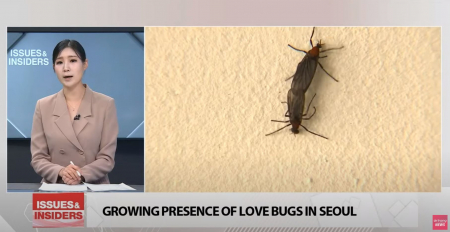Arirang News: GROWING PRESENCE OF LOVE BUGS, ABSENCE OF HONEY BEES









https://youtu.be/j75XCwHrdqg?si=m8lI_P2dZSnPODqA
퍼지는 러브버그, 사라지는 꿀벌
Welcome to Issues and Insiders.
Today we touch upon a rather disturbing phenomenon in the world of insects and more.
And for this I have Kwon Soa with me here in the studio.
Soa it's good to have you here.
I also have Choi Jonghwan a researcher at Seoul National University live on the line.
Jonghwan it's a pleasure.
1) Soa, first then, let's begin with some background information about the growing presence of love bugs here in Seoul during this time of the year.
2) Jonghwan, I understand that your research team at Seoul National University has been studying these love bugs here in the capital city.
Simply speaking, what are they, and how did they get here?
3) And now, Soa, do tell us a bit about the efforts underway to repel these love bugs.
4) Jonghwan, speaking as a scholar, what do you propose as part of efforts to get rid of these love bugs ?
5) Also, Jonghwan, what are the broader implications of the growing spread of love bugs within the environment?
6) Meanwhile Soa, I do believe we've had a fair share of battles against other bugs in the past as well, right?
Do remind us.
7) Jonghwan, how do you explain the recent rampant presence of bugs in communities here and perhaps, elsewhere?
8) Moving forward, Soa, an observation that is often linked to Albert Einstein, is the statement that "if honey bees were to disappear from Earth, we would be dead within 4 years."
Now regardless of whether or not, he said this, what remains true is that honey bees are disappearing, right?
What more can you tell us?
9) And Jonghwan, what can you share with us about the honey bee situation here in Korea?
10) Also, Soa, what safety measures are being recommended by experts to prevent the spread of insects as travel expands this summer?
11) Jonghwan, again as a scholar, what is the overall state of Korea's insect environment, and what further research is necessary to ensure its well-being?